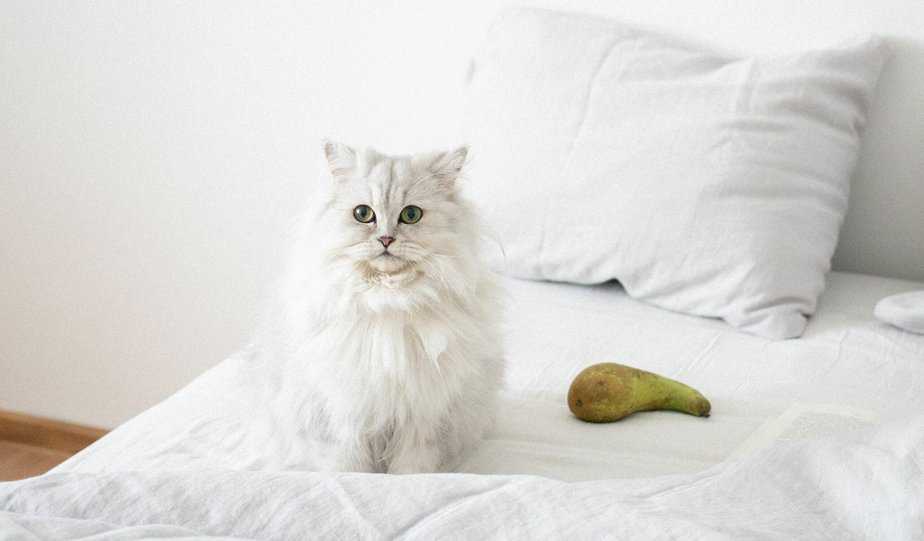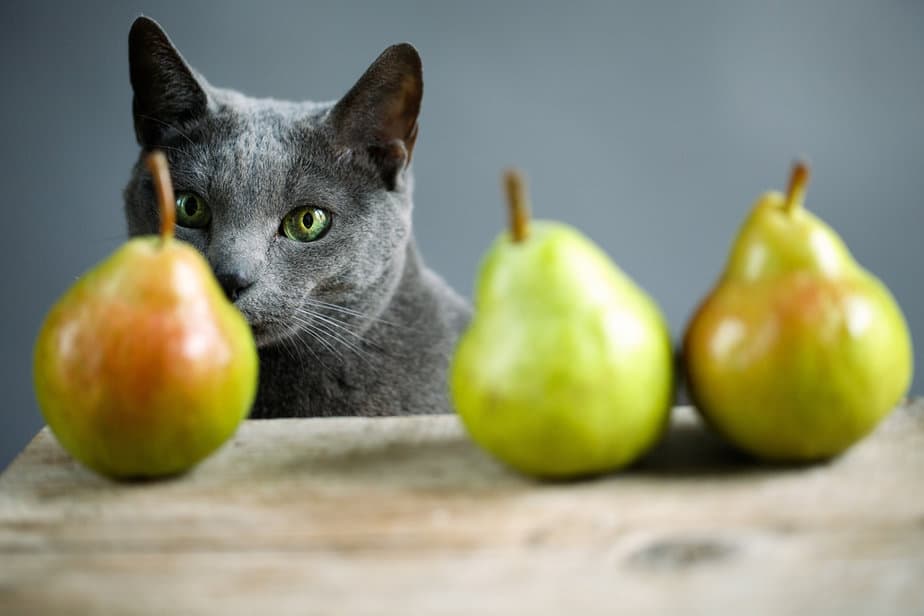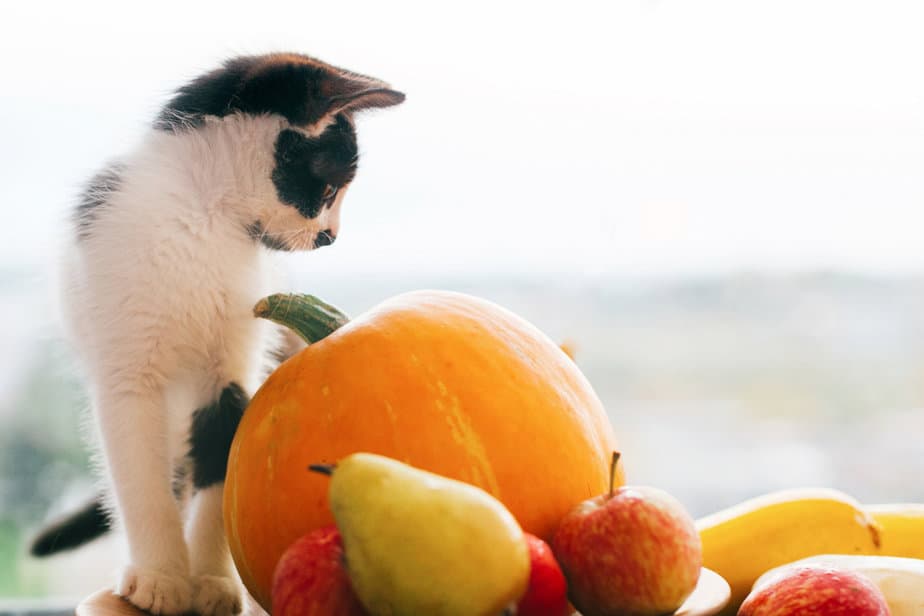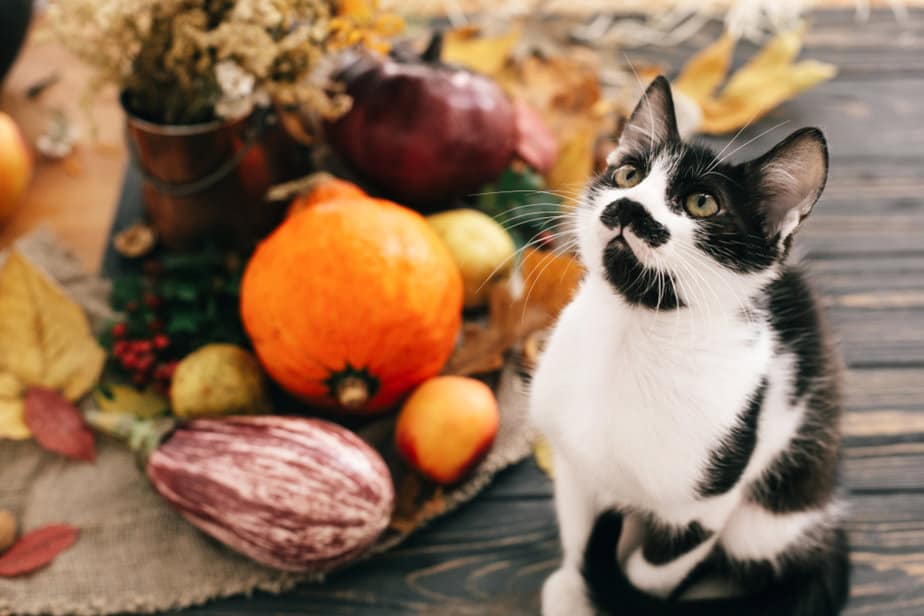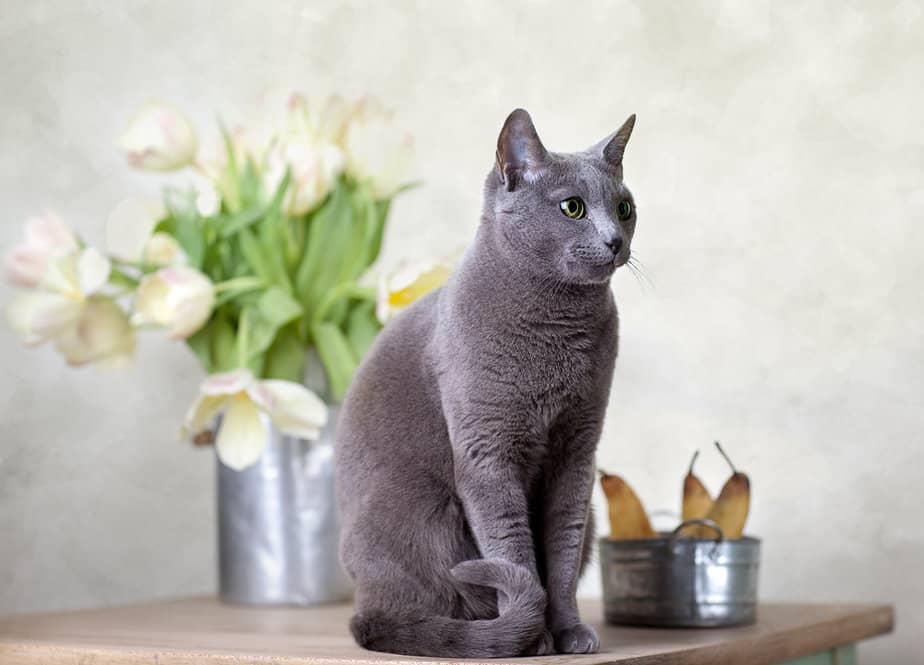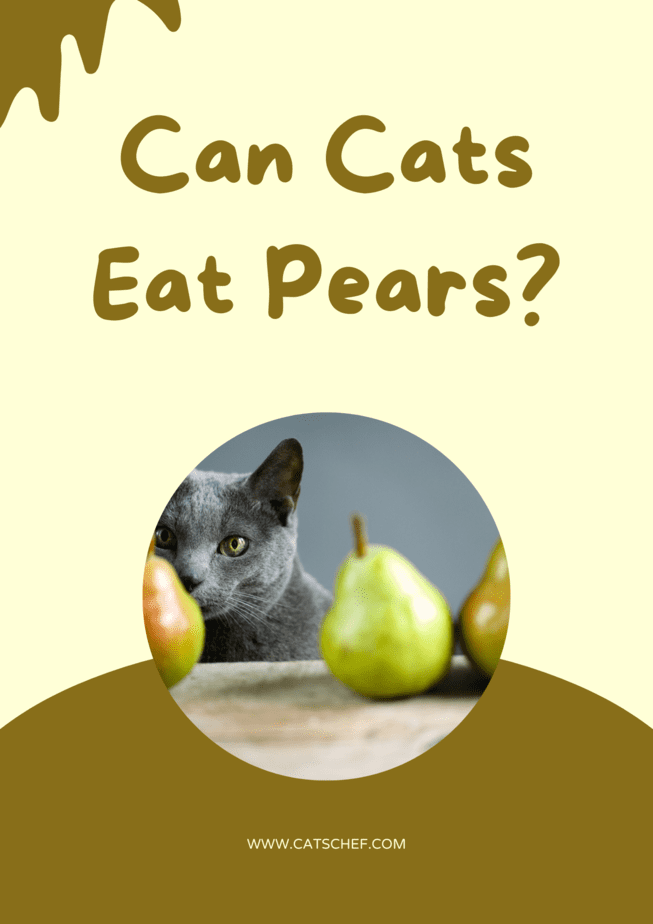📖 Table of Content:
“Can cats eat pears?!”, you screaming at the top of your lungs as you’re chasing your mischievous monster around the apartment. “She’s never even shown interest in anything that didn’t walk on two legs before! Oh my god, can cats eat pears?!”
You’re pretty sure she could already pare down her pear consumption because you’ve never heard of cats munching on this sweet treat. You’ve never noticed her sniffing around while you’re cutting up some fruit for your afternoon snack. You’ve never even seen her scrunch up her nose at the lingering fragrance.
“But, here we are, aren’t we!? There’s a first time for everything!”, you think to yourself. Your curious creature’s been getting chubbier and chunkier lately. So, she might even benefit from nibbling on pear rather than pork chops (right!?).
You’re positive she would LOVE leaning into a summer menu beaming with fruits – mouth-watering baked pears supervened by paw-licking pear custard pie and topped with an appealing pear apéritif (mocktail, of course!) Yes, you and your precious purrincess are bad and boujee.
“Argh, can cats eat pears because that sounds great?!” You came knocking at the right door! We’re locked, loaded, and ready to give you the scoop on the weird relationship between cats and pears.
According to our friends over at the APSCA (American Society for the Prevention of Cruelty to Animals), cats can eat pears. Pears are filled to the brim with fiber, vitamins, minerals, and antioxidants that can bring different sorts of benefits to your cat’s table.
And, they make for a quick and easy pick-me-up for when your mischievous monster’s acting up. But, there’s always a but when we’re talking about feeding your feline friend something that isn’t supposed to be a part of a cat’s diet.
Can cats eat pears?
“She can’t keep her paws to herself, she’s pushing that pear around the apartment like she’s gone completely bonkers!” Cats are curious creatures and they absolutely love learning new things about the world around them. And yes, that includes learning about pears by snatching them from your kitchen counter.
Cats can eat pears – and you can breathe out and prepare yourself to learn everything about the big, teardrop-shaped fruit. Pears grow on pear trees and shrubs. They can be found in China, Europe, and the United States (and many other parts of the world, depending on the type).
They’re a member of the Rosaceae family alongside apples, plums, peaches, and nectarines. Pears are super sweet and super versatile – they can be a part of savory dishes, salads, desserts, and even alcoholic and non-alcoholic drinks. Who wouldn’t want to get a load of that?!
But, cats are carnivores. On the off chance that you’ve been living under a rock, that means that they need a bunch of meat and animal protein in their diets. They don’t need fruits, veggies, and whole grains in their diets the same way humans do.
They don’t even possess the digestive enzymes necessary to break down and process most foods humans eat every day. Trust me, you must be mindful of the sneaky difference between foods that are healthy for the pet parent but detrimental for the pet.
Cats can eat pears, but they shouldn’t eat them as a regular part of their diet. They can have a nibble or two when they’re looking for a little somethin’ somethin’. Anything more than that could cause a bunch of digestive problems (vomiting and diarrhea, check).
How can cats eat pears safely?
“What do you mean when you say that cats can only eat pears on occasion? What do you mean ‘pears aren’t unsafe for cats but they shouldn’t be a regular part of their diet’? How can my cat eat pears without the repercussions?”
Feeding your four-legged friend anything that isn’t a natural part of their diet doesn’t come easy. There are many questions that need to be answered and veterinarians that need to be consulted. But, you can do that with a couple of simple tips and tricks!
Do’s
Your little munchkin’s giving you the look that says “hurry up before I snatch that pear right out of your hands!”? You have little to worry about! Cats can eat pears and your cat can have a pear locked, loaded, and ready to go within minutes. How?
Make sure to wash your pears before you feed them to your munching monster. Pears can have a bunch of pesticides and herbicides on their skin, and trust me, you don’t want those suckers anywhere near your cat. Washing them thoroughly in vinegar water should save you and your cat many sleepless nights.
Don’t forget to peel your pears, too! Pear peels can be pretty rough on your cat’s stomach and cause her a bunch of digestive problems. We’re talking nausea, vomiting, and diarrhea ALL AT ONCE. Cats tend to have pretty sensitive stomachs so you’re better off removing the thing that can cause her trouble.
And, of course, cut the pears into paw-sized bites. Munching and nibbling on a pear that hasn’t been cut can become a choking hazard. Cutting the pear into tiny tidbits can ensure your feline doesn’t eat too much – you can easily control the portion.
Pears are pretty great because they’re beaming with fiber, vitamins, minerals, and antioxidants. An occasional bite of pear can boost your cat’s immune system, ensure the health of her digestive system, and maintain the proper function of her nervous system.
Fiber provides bulk to help food move through the digestive tract and retains water to help your cat deal with digestive problems. Vitamins C helps the production of collagen, and vitamin K ensures the proper synthesis of protein. Potassium and copper help regulate your cat’s body functions.
Pears are pretty great, don’t you think?
Don’ts
But, they can easily become not-so-great when you’re not paying enough attention. Cats can eat pears only on occasion because these tasty treats are packed with sugar and… cyanide. “Wait, what?!” Worry not, we’re bringing you the don’ts of feeding pears to your cat.
“Sugar, yes please!”, never have the words of the Maroon 5 song been as wrong as they are right now. Pears contain quite a lot of sugar, which humans don’t make much fuss about because we’re talking about natural, unprocessed sugar.
But, our furry friends’ digestive systems don’t care where the sugar comes from. They have a rough time digesting this carbohydrate either way. They’re carnivores and they don’t possess the enzymes necessary to break down and process fructose. They don’t really need it for anything.
What does that mean for your furball? Well, on the off chance that she does keep munching on pears every single day she might develop digestive problems such as nausea, diarrhea, and vomiting. She might even develop other health problems such as weight gain, obesity, and diabetes.
And, what’s this whole thing about cyanide? Shouldn’t pears be off limits to your fur child if they contain cyanide? The flesh of the pear (and pretty much every other part) doesn’t contain this dangerous compound. This is why pears are considered safe for felines.
But, the seeds of the pear contain a certain amount of cyanide which can cause harm to your feline friend. Unless you remove the seeds (and prepare the pear the way we’ve mentioned above), your feline might experience symptoms of cyanide poisoning.
Symptoms of cyanide poisoning include drooling, wheezing, watery eyes, runny nose, vomiting, and diarrhea. Contact your vet the moment that you notice any of these symptoms.
Can cats eat fresh pears?
Yes, cats can eat fresh pears! Actually, that’s the best way you can incorporate this tasty treat into your cat’s diet. Fresh pears contain the most amount of fiber, vitamins, minerals, and antioxidants that can make your purr machine happy and healthy.
Don’t forget to wash, peel, cut, and remove the seeds before you feed the pear to your cat! Fresh pears are great! But, there’s always a but when you’re feeding your cat something she isn’t necessarily supposed to eat. Make sure you only give her one or two bites before you take the pear away for good.
She might beg and meow for you to come back, but you’re better off staying on the safe side of things. You don’t want to spend the night at the emergency animal center because you couldn’t say “No!” to those paw-dorable eyes!
Can cats eat dried pears?
Cats can’t eat dried pears! Fresh pears might not be the best thing your little munchkin can munch on while you’re watching the reruns of Friends. They might not be a sugar-free option for a cat treat. But, at least they’re better than the dried ones because they contain a lot less sugar.
That’s right, dried pears are beaming with sugar that can send your four-legged friend running to her litter box. Her legs might be quick, but they’re not quick enough for the amount of sugar contained in a packet of dried pears.
But, there’s a catch – you can make them on your own! Making dried pears from scratch in the comfort of your own kitchen can be a great bonding moment. And, it can also be a great way to avoid excess sugar and to make something your friend can munch on.
Can cats eat canned pears?
Cats can’t eat canned pears! Yep, canned pears can contain a bunch of dangerous ingredients apart from the aforementioned sugars. Unfortunately, canned pears contain sweeteners and preservatives that can cause harm to your cat’s health.
Some sweeteners and preservatives are even considered poisonous to felines. So, unless you’ve done your research and spoken to a professional, you’re better off avoiding canned pears (and other canned fruits).
And, let’s be honest, your feline would rather munch on something saltier and meatier. Make sure you always keep a couple of cat treats under your sleeve for whenever she’s begging you to taste something she shouldn’t. Make your cat’s health your priority and keep the canned pears out of her reach.
